SPEAKERS
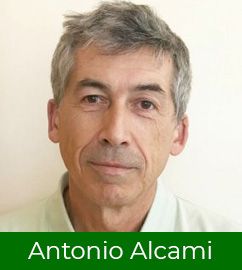
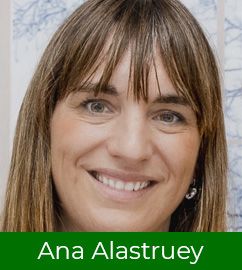
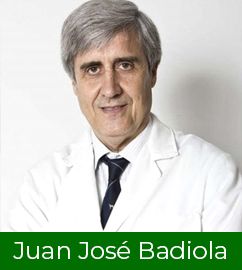
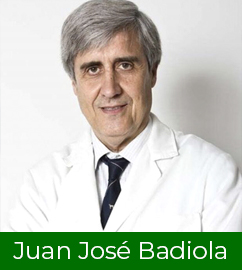
Juan José Badiola
He was born in León in 1948. He studied Veterinary Medicine at the Faculty of Veterinary Medicine in Zaragoza and Madrid. Zaragoza and Madrid, being Licensed and Doctor in Veterinary Medicine by the Universidad Complutense. He has developed his academic activity at the University of Zaragoza.
Her research activity is mainly in the field of Medical Mycology, in which she has worked especially on the relationship between the environment and health. In this line, her work on the search for the ecological niche of agents of systemic mycoses, especially fungi of the genus Cryptococcus, and the relationship between the respiratory mycobiome and the domestic environment are particularly noteworthy. He has developed his professional and research activity in the field of animal disease diagnosis and research of animal diseases, having developed numerous works in the field of transmissible spongiform encephalopathies and diseases caused by retroviruses and mycobacteria. Dr. Badiola was the Rector of the University of Zaragoza (1992-2000), Director of the National Reference Center for Transmissible Spongiform Encephalopathies and Director of the World Organization for Animal Health Reference Laboratory for Spongiform Encephalopathies. He is the author of nearly 200 research articles and director of 35 PhD theses. He is currently considered one of the references in the field of animal health, food safety and public health in Spain.

 Ilaria Capua (DVM, PhD) is a Senior Fellow of Global Health at Johns Hopkins University – SAIS Europe, Courtesy Professor and Director Emeritus of the One Health Center of Excellence at the University of Florida. She has dedicated much of her career to animal viral infections that can be transmitted to humans, which cause poverty and food security issues such as Avian Influenza, Newcastle Disease and Rabies. She has also worked with international organizations to develop strategies for the prevention and management of health emergencies caused by potentially pandemic viruses. She has published over 230 articles in peer reviewed international journals and has an H-index of 72. She is currently on the advisory board of several EU projects including REGROUP and DURABLE and am a commissioner of the Lancet Commission on “21st Century Threats to Global Health”. Ilaria has developed the concept of Circular Health which is now the main focus of her teaching and research activities. Ilaria was a Member of the Italian Parliament (2013-2016) and she a columnist for Corriere della Sera.
Ilaria Capua (DVM, PhD) is a Senior Fellow of Global Health at Johns Hopkins University – SAIS Europe, Courtesy Professor and Director Emeritus of the One Health Center of Excellence at the University of Florida. She has dedicated much of her career to animal viral infections that can be transmitted to humans, which cause poverty and food security issues such as Avian Influenza, Newcastle Disease and Rabies. She has also worked with international organizations to develop strategies for the prevention and management of health emergencies caused by potentially pandemic viruses. She has published over 230 articles in peer reviewed international journals and has an H-index of 72. She is currently on the advisory board of several EU projects including REGROUP and DURABLE and am a commissioner of the Lancet Commission on “21st Century Threats to Global Health”. Ilaria has developed the concept of Circular Health which is now the main focus of her teaching and research activities. Ilaria was a Member of the Italian Parliament (2013-2016) and she a columnist for Corriere della Sera.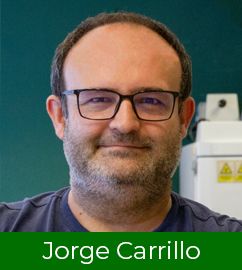
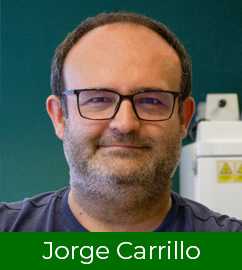 Dr. Carrillo obtained his bachelor’s in Biology at the University of Cordoba (Spain), and a Ph.D. in Immunology at the Autonomous University of Barcelona (Spain). He was awarded with the “Best Doctoral Thesis Award” in 2009. After several postdoctoral position in University of Lleida, IrsiCaixa, Icahn School of Medicine at Mount Sinai (NY, USA). Dr. Carrillo returned to IrsiCaixa in 2015 as associated investigator and co-founded the spin-o AlbaJuna Therapeutics, serving as Chief Scientific O icer.
Dr. Carrillo obtained his bachelor’s in Biology at the University of Cordoba (Spain), and a Ph.D. in Immunology at the Autonomous University of Barcelona (Spain). He was awarded with the “Best Doctoral Thesis Award” in 2009. After several postdoctoral position in University of Lleida, IrsiCaixa, Icahn School of Medicine at Mount Sinai (NY, USA). Dr. Carrillo returned to IrsiCaixa in 2015 as associated investigator and co-founded the spin-o AlbaJuna Therapeutics, serving as Chief Scientific O icer. In 2020, Dr. Carrillo became an independent principal investigator and founded the Immunology Group at IrsiCaixa. From that, He has been granted with five research projects in competitive calls, including a Horizon Europe project as coordinator (101137248 — LWNVIVAT). Dr. Carrillo is part of five patents with worldwide applications: WO/2019/108656, WO/2018/207023, WO/2018/020324, WO/2017/085563 and WO2014037490A1; and an additional one was presented in February 2023. He has co-authored more than 95 papers and supervised four doctoral theses. He has been member of the board of the Spanish Society of Immunology (2018-2022) and is the head of the Ethics Committee for Animal Experimentation (CEEA) of the IGTP (from 2018). ember of Editorial Boards, and coordinator of institutional EU projects, and summer schools. She is very active in media, press, TV, radio about the COVID pandemic
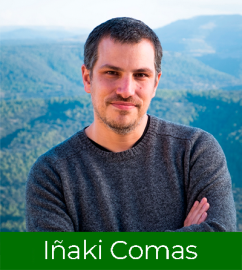
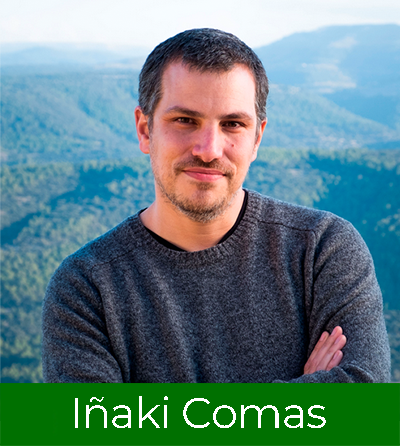 Dr. Iñaki Comas, Full Professor, is head of the Tuberculosis Genomics Unit at the Institute of Biomedicine of Valencia CSIC, has led pioneering research on tuberculosis and COVID-19 pathogens. His work on TB includes studies on how to use the pathogen's genomic information to improve the local and global control of the disease. His studies had led to new insights into the evolution and epidemiology of the pathogen, emergence and spread of drug resistance and impact of immune responses in the pathogen.
Dr. Iñaki Comas, Full Professor, is head of the Tuberculosis Genomics Unit at the Institute of Biomedicine of Valencia CSIC, has led pioneering research on tuberculosis and COVID-19 pathogens. His work on TB includes studies on how to use the pathogen's genomic information to improve the local and global control of the disease. His studies had led to new insights into the evolution and epidemiology of the pathogen, emergence and spread of drug resistance and impact of immune responses in the pathogen.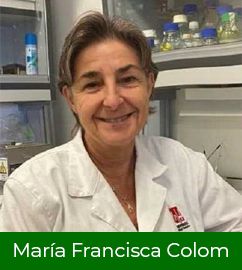
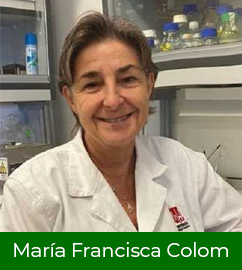
Since 1997 she has been Associate Professor of Microbiology at the Faculty of Medicine of the Miguel Hernández University in Alicante (Spain).
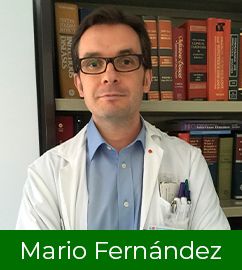
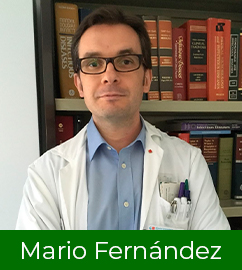 Mario Fernández Ruiz es especialista en Medicina Interna, Magister Universitario en “Infección en el Paciente Inmunodeprimido” por la Universidad Complutense de Madrid, y Doctor en Medicina (Premio Extraordinario) por esa misma universidad. Desarrolla su actividad asistencial e investigadora en la Unidad de Enfermedades Infecciosas del Hospital Universitario “12 de Octubre” y en el Instituto de Investigación i+12.
Mario Fernández Ruiz es especialista en Medicina Interna, Magister Universitario en “Infección en el Paciente Inmunodeprimido” por la Universidad Complutense de Madrid, y Doctor en Medicina (Premio Extraordinario) por esa misma universidad. Desarrolla su actividad asistencial e investigadora en la Unidad de Enfermedades Infecciosas del Hospital Universitario “12 de Octubre” y en el Instituto de Investigación i+12. Ha realizado estancias formativas en el Hospital Clinic de Barcelona, en el Multi-Organ Transplant Program del Toronto General Hospital y en el Centre Hospitalier Universitaire Vaudois en Lausana. Su principal línea de investigación se centra en la infección en el receptor de trasplante de órgano sólido y otros pacientes inmunodeprimidos, el desarrollo y validación de estrategias de monitorización inmunológica, y la interacción huésped-patógeno. Es autor o coautor de más de 300 publicaciones en revistas nacionales e internacionales, sumando más de 4.500 citas (índice h de 40 [Thomson Reuters Web of Science]).
Entre 2017 y 2021 presidió el Grupo de Estudio de Infección en el Trasplante y el Huésped Inmunocomprometido (GESITRA-IC) de la Sociedad Española de Enfermedades Infecciosas y Microbiología Clínica (SEIMC). Ha recibido, entre otros, el Premio al “Internista Joven del año 2014” concedido por la Sociedad Española de Medicina Interna (SEMI), el Young Investigator Award for Research 2017 otorgado por la European Society of Clinical Microbiology and Infectious Diseases (ESCMID), y el 2021 Young Investigator Award de la International Immunocompromised Host Society (ICHS).
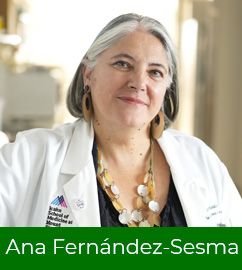
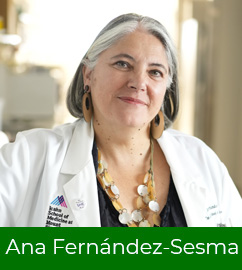
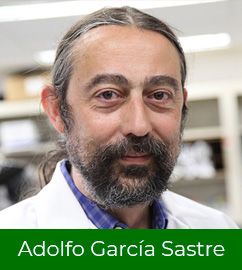
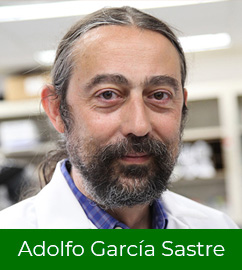 Dr. García-Sastre is Professor in the Department of Microbiology at Icahn School of Medicine Mount Sinai (ISMMS) in New York. He is also Director of the Global Health and Emerging Pathogens Institute at ISMMS. For the past 30 years, his research interest has been focused on the molecular biology, virus-host interactions, innate immunity and pathogenesis of influenza viruses and several other RNA viruses, as well as on the development of new vaccines and antivirals. He has more than 700 peer-reviewed publications in these areas of research. In 2019, he was elected a member of the National Academy of Sciences and of the National Academy of Inventors.
Dr. García-Sastre is Professor in the Department of Microbiology at Icahn School of Medicine Mount Sinai (ISMMS) in New York. He is also Director of the Global Health and Emerging Pathogens Institute at ISMMS. For the past 30 years, his research interest has been focused on the molecular biology, virus-host interactions, innate immunity and pathogenesis of influenza viruses and several other RNA viruses, as well as on the development of new vaccines and antivirals. He has more than 700 peer-reviewed publications in these areas of research. In 2019, he was elected a member of the National Academy of Sciences and of the National Academy of Inventors.
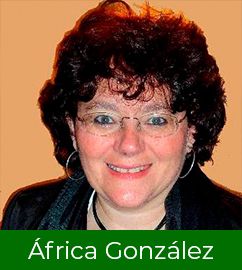
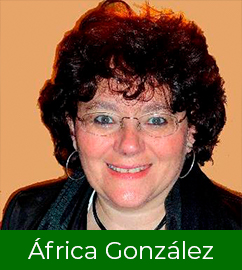 Prof. África González-Fernández (MD, PhD, Immunologist) was born in Madrid (Spain) and studied Medicine and Surgery in the University of Alcalá de Henares (Madrid, Spain) with special honours. She obtained her PhD in the same University and performed the speciality in Immunology as Medical Internal resident (4 years) at the Hospital Puerta de Hierro (Madrid). She spent 4 years as post doc with Dr. Cesar Milstein (Nobel Prize winner for the monoclonal antibody technology) in the Laboratory of Molecular Biology-Medical Research Council (LMB-MRC) in Cambridge (UK).
Prof. África González-Fernández (MD, PhD, Immunologist) was born in Madrid (Spain) and studied Medicine and Surgery in the University of Alcalá de Henares (Madrid, Spain) with special honours. She obtained her PhD in the same University and performed the speciality in Immunology as Medical Internal resident (4 years) at the Hospital Puerta de Hierro (Madrid). She spent 4 years as post doc with Dr. Cesar Milstein (Nobel Prize winner for the monoclonal antibody technology) in the Laboratory of Molecular Biology-Medical Research Council (LMB-MRC) in Cambridge (UK). She returned to Spain becoming Full Professor of Immunology in the University of Vigo (Spain). She is leading a research group in the field of immune response to vaccines, Nanomedicine, toxicity and immunogenicity to nanomaterials. She was Director of the Biomedical Research Center (CINBIO) in the University of Vigo (2009-2019), considered an excellent center by Xunta de Galicia. She was the former President of the Spanish society for Immunology (2016-2020). She has published over 180 papers and book chapters, some of them in very top journals such as Nature, Nature Nanotechnology, Cell, ACS-Nano, PNAS.
She is regularly invited to give conferences in several international and national congresses, workshops. She developed 4 patents and is co-promoter of the spin-off company called “NanoImmunoTech” (2009- currently). She has been nominated for the EU women innovator Prize (2017), is member of Editorial Boards, and coordinator of institutional EU projects, and summer schools. She is very active in media, press, TV, radio about the COVID pandemic
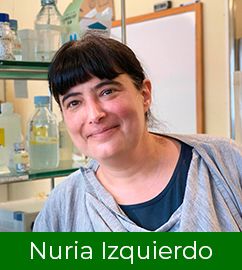
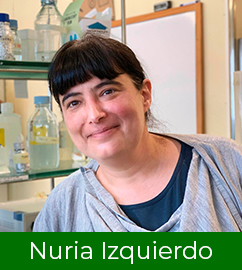
Dr. Izquierdo is a biologist trained in Madrid with a strong interest in virology, cell biology, and translational applications. During her PhD in Barcelona (Spain), Nuria was funded by a competitive FI fellowship from the AGAUR at IrsiCaixa, where she began a new research line focusing on HIV-1 pathogenesis mediated by dendritic cells. Nuria made two international stays at the Centre Hospitalier Universitaire Vaudois (Switzerland) and Boston University School of Medicine (USA). After, she was funded with a José Castillejo fellowship of the Spanish Government to do a postdoc with Prof. Dr. HG Krausslich at Heidelberg University (Germany).
In 2012, she returned to IrsiCaixa, where she was awarded with one out of the six Mathilde Krim Fellowships given worldwide by the Foundation for AIDS Research amfAR. There she worked as an associate researcher and PI of several projects until she obtained an independent position after a competitive selection process in 2020. Since then, Nuria has led a group at IrsiCaixa focused on Pathogen Immunity, Signaling & Therapeutic Applications (PISTA). In a world that is becoming particularly vulnerable to emerging pathogens that thrive in new geographical areas due to globalization trends and climate change, her mission is to understand the underlying biology and basic aspects of human infection to develop novel therapeutic strategies. As an emerging group studying emerging viruses, her laboratory want to lead the rational design of broad antiviral tools to fortify and strengthen preparedness against new viral threats. In their endeavor to develop innovative antiviral strategies, her laboratory actively collaborates with clinical researchers, academic partners, and industries.
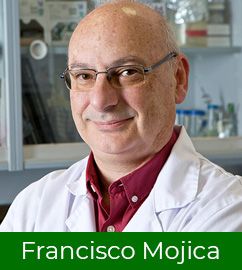
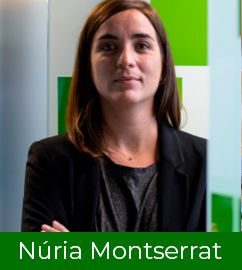
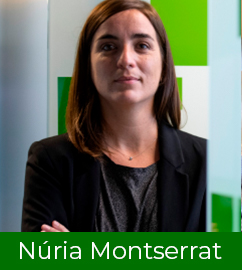
Nuría Montserrat My research interests are focused on understanding how human tissues and organs are formed to target genetic and/or environmental factors perturbing these processes. Towards this goal in the laboratory we combine a wide range of multidisciplinary approaches making use of bioengineering to externally guide and control the generation and differentiation of the unique cell type amenable for these interventions in vitro: the so called human pluripotent stem cells. Our research has faithfully shown on the development of new approaches to generate these cell sources through somatic reprogramming and the design and implementation of technical advances to externally control and guide their differentiation into tissue- or organ-like culture systems in vitro. Collectively, these advances have allowed us to study genetic and systemic conditions explaining early cellular and molecular mechanisms driving heart, kidney, and the retina development as well to exploit these culture systems to target human disease.
My research activity was recognized with the prestigious ERC-Starting grant (call 2014) allowing me to establish my laboratory as Junior Group Leader at the Institute of Bioengineering of Catalonia (IBEC) since December 2015. By 2019, I was promoted as ICREA Research Professor and Senior Group Leader being recently awarded with an ERC Consolidator Grant (call 2020) to pursue our studies on the generation of organ-like tissue models, the so-called organoids, to target congenital defects of the kidney and the urinary tract. I was awarded by the prestigious EMBO with the Young Investigator Prize by 2020.
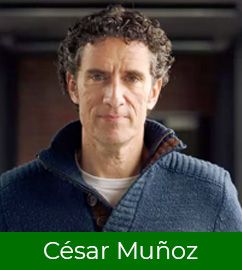
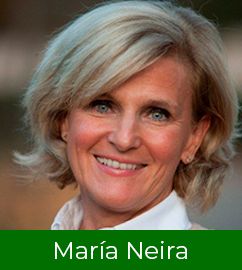
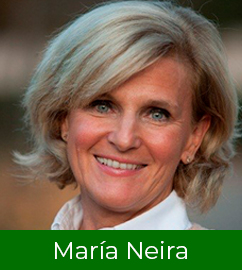 Dr Maria P. Neira has been directing the Department of Environment, Climate Change and Health at the World Health Organization, Geneva, Switzerland since September 2005. Throughout her tenure and up until now she has led and advised on policy and management in key areas of environmental health.
Dr Maria P. Neira has been directing the Department of Environment, Climate Change and Health at the World Health Organization, Geneva, Switzerland since September 2005. Throughout her tenure and up until now she has led and advised on policy and management in key areas of environmental health. Prior to that she served as Under-Secretary of Health and President of the Spanish Food Safety Agency. From 1993-1998 she was Coordinator of the Global Task Force on Cholera Control. Dr Neira began her career as a medical coordinator working with refugees in El Salvador and Honduras for Médecins Sans Frontières (Doctors Without Borders). She then spent several years working in different African countries during armed conflicts.
Born in the city of Oviedo, Asturias, Dr Neira is a Spanish national, a medical doctor by training and specialized in Endocrinology and Metabolic Diseases; and Public Health. Among many distinctions, she has been awarded the Médaille de l'Ordre national du Mérite by the Government of France and received an “Extraordinary Woman” award by HM Queen Letizia of Spain. In early 2019, she was nominated among the top 100 policy influencers in health and climate change.
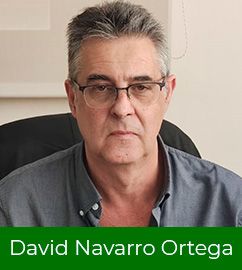
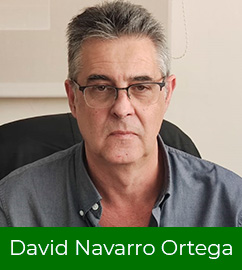 David Navarro graduated from Medical School at the University of Valencia (Spain) in 1985 and achieved his Doctor of Medicine degree in Microbiology and Immunology in the University of Valencia, Spain in 1989. He completed a postdoctoral research associate job (1989-1991) at the University of California San Francisco (UCSF).
David Navarro graduated from Medical School at the University of Valencia (Spain) in 1985 and achieved his Doctor of Medicine degree in Microbiology and Immunology in the University of Valencia, Spain in 1989. He completed a postdoctoral research associate job (1989-1991) at the University of California San Francisco (UCSF). He is currently Full Professor of Microbiology in School of Medicine of Valencia and Head of the Microbiology Service at the Clinic University Hospital, Valencia. His research activity mainly concerns diagnostic, clinical, biological and pathogenesis aspects of herpesvirus infections, especially cytomegalovirus in allogeneic stem-cell and solid organ transplant recipients, as well as in patients with inflammatory diseases and critically ill patients with no canonical immunosuppression and recently SARS-CoV-2.
He has authored or co-authored over 350 publications in intermediate-highly- ranked journals. He is Associate Editor of the Journal of Medical Virology, member of the Editorial Board of Diagnostic Microbiology and Infectious Diseases, member of the ECIL group of the European Bone Marrow Transplantation Society (EBMT) and regular reviewer for more than 30 journals.
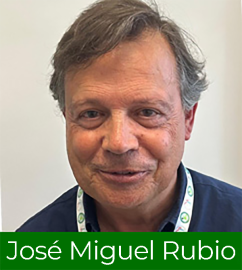
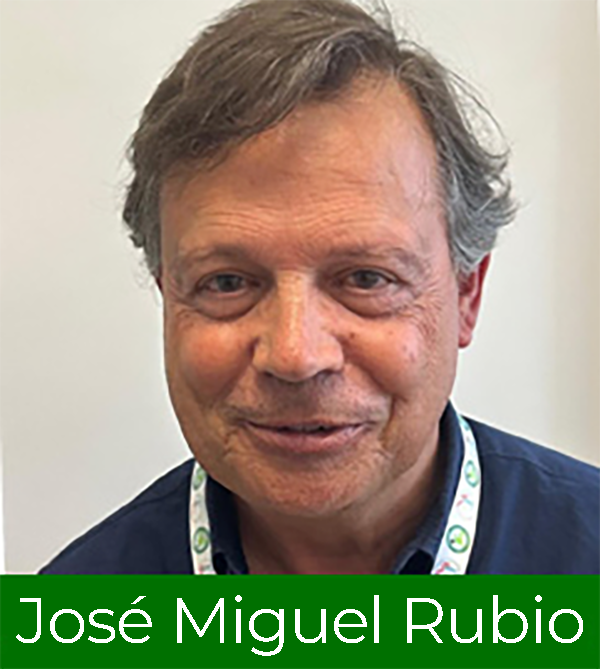 José Miguel Rubio (Madrid) Doctor en Biología por la Universidad Autónoma de Madrid (1992). Desde 1998 es miembro del Instituto de Salud Carlos III (ISCIII), Científico Titular, Responsable de la Unidad de Malaria y Parasitosis Emergentes del Centro Nacional de Microbiología. Forma parte del Centro de Investigación Biomédica en Red de Enfermedades Infecciosas (CIBERINFEC/ISCIII). Ha publicado más de 100 artículos en revistas indexadas internacionales, 10 capítulos de libros y ha sido coeditor de dos libros dentro del área de malaria, medicina tropical y enfermedades olvidadas
José Miguel Rubio (Madrid) Doctor en Biología por la Universidad Autónoma de Madrid (1992). Desde 1998 es miembro del Instituto de Salud Carlos III (ISCIII), Científico Titular, Responsable de la Unidad de Malaria y Parasitosis Emergentes del Centro Nacional de Microbiología. Forma parte del Centro de Investigación Biomédica en Red de Enfermedades Infecciosas (CIBERINFEC/ISCIII). Ha publicado más de 100 artículos en revistas indexadas internacionales, 10 capítulos de libros y ha sido coeditor de dos libros dentro del área de malaria, medicina tropical y enfermedades olvidadas
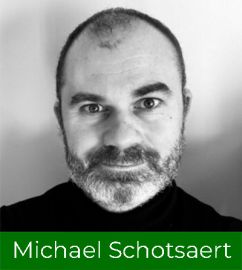
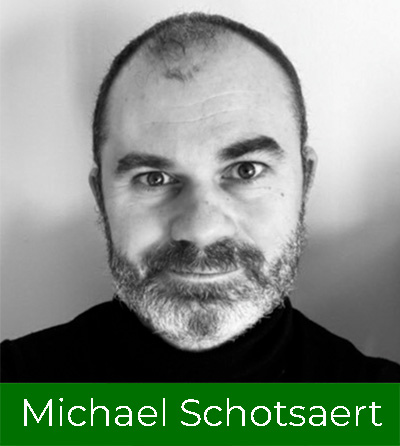 Dr. Schotsaert obtained a master’s degree in bio-engineering (2003), a master’s degree in molecular medical biotechnology (2004) and a PhD in molecular biotechnology (2011) from Ghent University (Belgium). In 2013 he moved for postdoctoral work as an immunologist and vaccinologist to the Icahn School of Medicine at Mount Sinai in New York city. Dr. Schotsaert holds faculty appointments in the Department of Microbiology and the Department of Immunology and Immunotherapy at the Icahn School of Medicine at Mt Sinai. The Schotsaert laboratory is part of the Global Health and Emerging Pathogens Institute, and affiliated with the Icahn Genomics Institute and the Marc and Jennifer Lipschultz Precision Immunology Institute. His work focuses on influenza, ZIKA and SARS-CoV-2 viruses and he has over twenty years of experience with studying host-pathogen interactions in preclinical infection models (BSL2, BSL3, BSL3+) to immunologically characterize and validate candidate vaccines, adjuvants and antiviral treatments. From an immunological point of view, his research focuses on the interplay and cross-talk between innate and adaptive immune responses during virus infection, and how they contribute to pathology and protection in the context of comorbidities like obesity, diabetes and advanced age.
Dr. Schotsaert obtained a master’s degree in bio-engineering (2003), a master’s degree in molecular medical biotechnology (2004) and a PhD in molecular biotechnology (2011) from Ghent University (Belgium). In 2013 he moved for postdoctoral work as an immunologist and vaccinologist to the Icahn School of Medicine at Mount Sinai in New York city. Dr. Schotsaert holds faculty appointments in the Department of Microbiology and the Department of Immunology and Immunotherapy at the Icahn School of Medicine at Mt Sinai. The Schotsaert laboratory is part of the Global Health and Emerging Pathogens Institute, and affiliated with the Icahn Genomics Institute and the Marc and Jennifer Lipschultz Precision Immunology Institute. His work focuses on influenza, ZIKA and SARS-CoV-2 viruses and he has over twenty years of experience with studying host-pathogen interactions in preclinical infection models (BSL2, BSL3, BSL3+) to immunologically characterize and validate candidate vaccines, adjuvants and antiviral treatments. From an immunological point of view, his research focuses on the interplay and cross-talk between innate and adaptive immune responses during virus infection, and how they contribute to pathology and protection in the context of comorbidities like obesity, diabetes and advanced age.
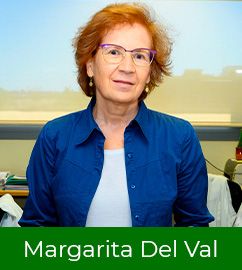
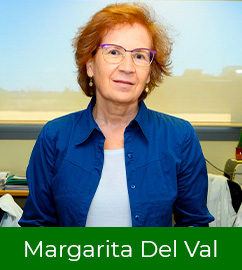 Margarita Del Val studied chemistry at Universidad Autónoma de Madrid and trained in virology and molecular biology at Centro de Biología Molecular (CSIC-UAM) in Madrid. She moved into viral immunology in Germany first, and further developed it at Instituto de Salud Carlos III and again at CBMSO. Her research focuses on understanding how the immune system controls virus infections in vivo, with a focus on vaccine improvement through understanding basic immunologic mechanisms of cellular immunity. She is a member of the Royal National Academy of Pharmacy, the Madrid Vaccines Advisory Team, and worked as external adviser for the European Medicines Agency. She heads the Spanish CSIC Interdisciplinary Research Platform on Global Health for fighting the SARS2 coronavirus pandemic. As the pandemic stroke, this background pushed her into front line science dissemination, for which she was awarded the FBBVA-CSIC prize and the UIMP Social Values Medal.
Margarita Del Val studied chemistry at Universidad Autónoma de Madrid and trained in virology and molecular biology at Centro de Biología Molecular (CSIC-UAM) in Madrid. She moved into viral immunology in Germany first, and further developed it at Instituto de Salud Carlos III and again at CBMSO. Her research focuses on understanding how the immune system controls virus infections in vivo, with a focus on vaccine improvement through understanding basic immunologic mechanisms of cellular immunity. She is a member of the Royal National Academy of Pharmacy, the Madrid Vaccines Advisory Team, and worked as external adviser for the European Medicines Agency. She heads the Spanish CSIC Interdisciplinary Research Platform on Global Health for fighting the SARS2 coronavirus pandemic. As the pandemic stroke, this background pushed her into front line science dissemination, for which she was awarded the FBBVA-CSIC prize and the UIMP Social Values Medal.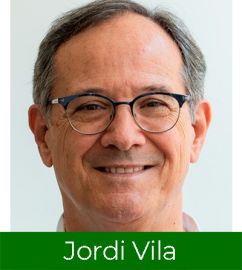
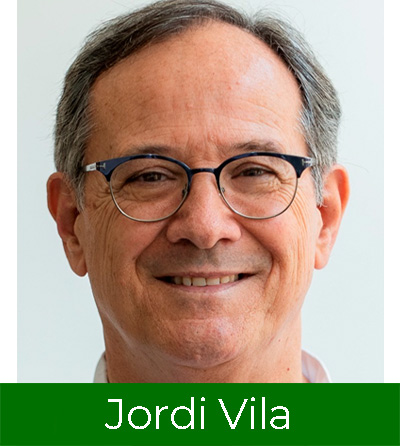 Dr. Vila is a Senior Consultant at the Department of Clinical Microbiology of the Hospital Clinic in Barcelona, Full Professor of the School of Medicine, University of Barcelona, and Research Professor in the Institute for Global Health (ISGlobal) of Barcelona, Spain. In this last institution, he is leading the Initiative of Antimicrobial Resistance. His main field of interest is the development of new drugs against MDR bacteria and molecular tools for rapid diagnosis of infectious disease. Dr. Vila was the Programme Director of EECMID from 2009 to 2014 and he was the president of the Spanish Society of Infectious Diseases and Clinical Microbiology (SEIMC) (2019-2021). In addition, he has received (2023) an Award of the Spanish Society of Infectious Diseases and Clinical Microbiology for his excellent career in clinical microbiology. He has published 520 articles in peer-reviewed journals, has an H-index of 99 and 40,235 citations (Google Academia). He has patented five molecules.
Dr. Vila is a Senior Consultant at the Department of Clinical Microbiology of the Hospital Clinic in Barcelona, Full Professor of the School of Medicine, University of Barcelona, and Research Professor in the Institute for Global Health (ISGlobal) of Barcelona, Spain. In this last institution, he is leading the Initiative of Antimicrobial Resistance. His main field of interest is the development of new drugs against MDR bacteria and molecular tools for rapid diagnosis of infectious disease. Dr. Vila was the Programme Director of EECMID from 2009 to 2014 and he was the president of the Spanish Society of Infectious Diseases and Clinical Microbiology (SEIMC) (2019-2021). In addition, he has received (2023) an Award of the Spanish Society of Infectious Diseases and Clinical Microbiology for his excellent career in clinical microbiology. He has published 520 articles in peer-reviewed journals, has an H-index of 99 and 40,235 citations (Google Academia). He has patented five molecules.

